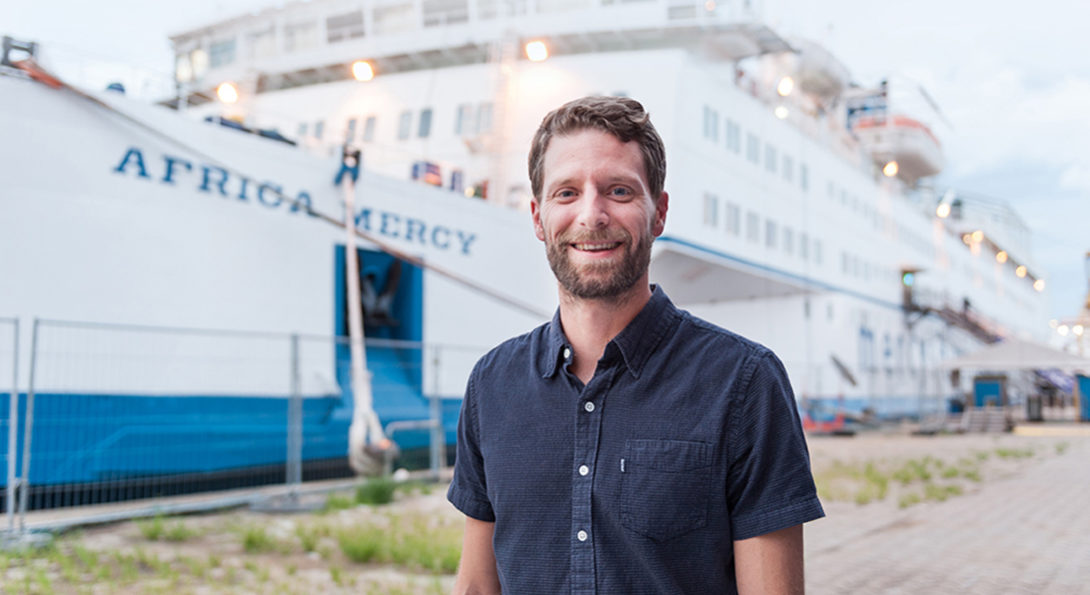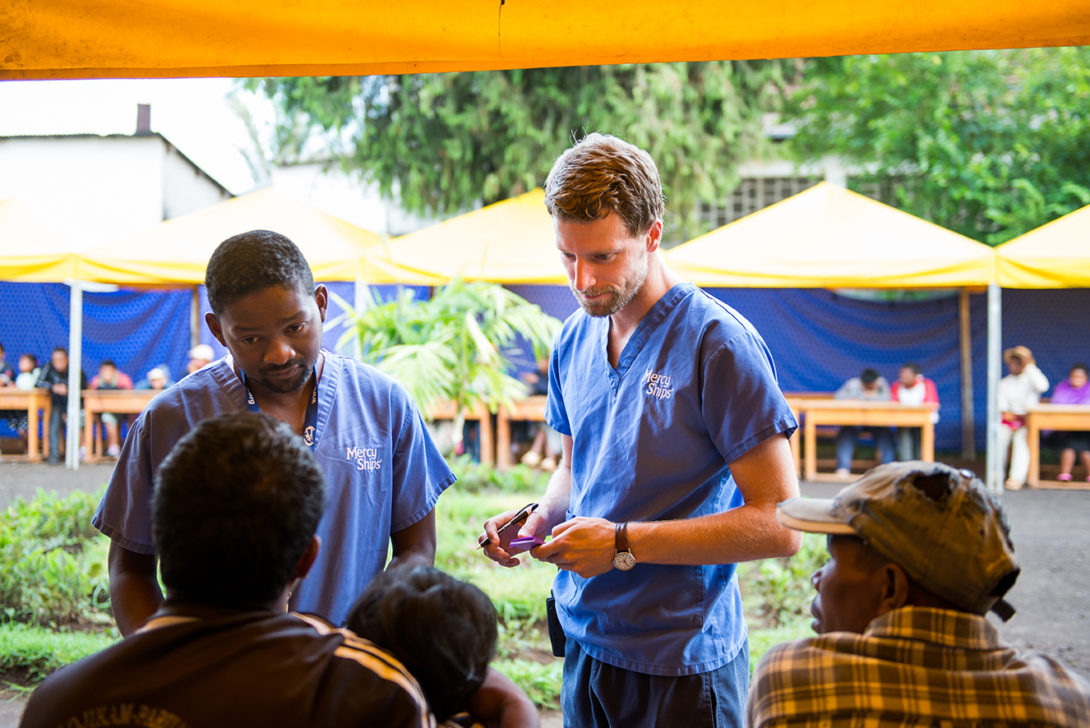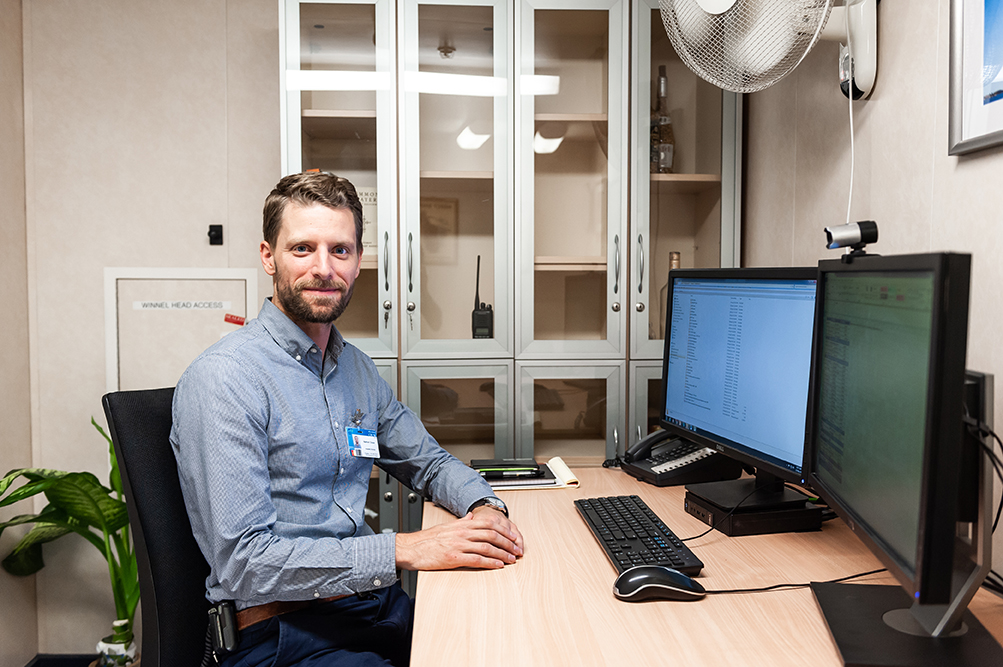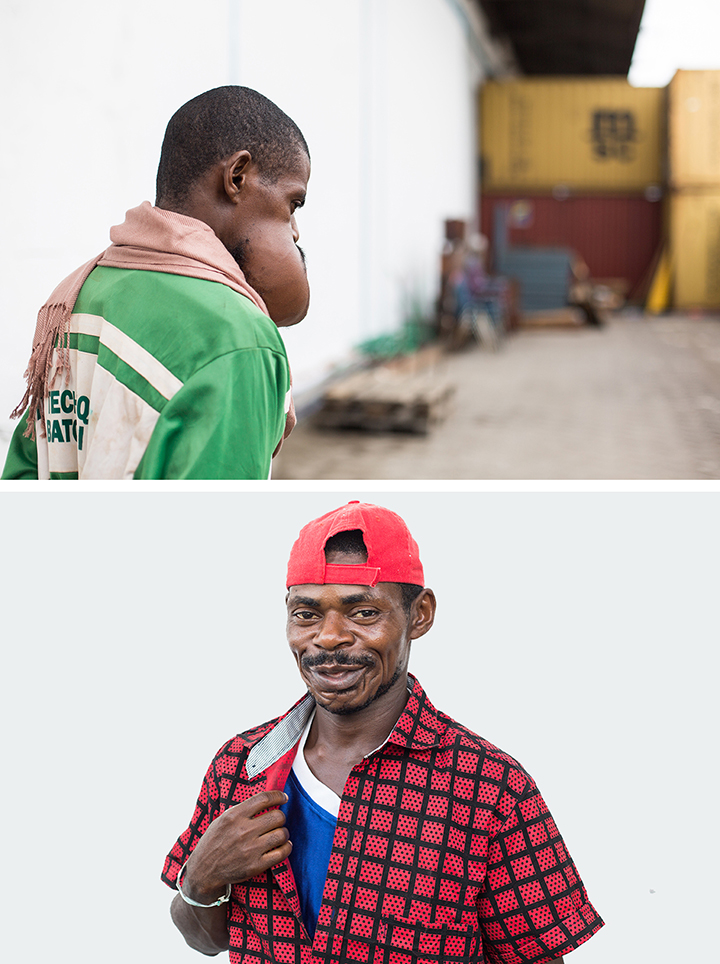Alumnus brings hope to surgical patients in Africa

As director of a floating hospital, Nathan Claus, BSN '08, uses the leadership lessons he learned at UIC to provide transformative surgery on an unusual platform.
body copy
On one of the first days that the Africa Mercy docked in Cameroon last fall, a man approached the ship wearing a scarf over his face.
Beneath it, a tumor the size of a cantaloupe had ballooned across his neck, mouth and cheek. The man, who traveled two days across the central African country to the ship, did not speak much. The tumor was bleeding and forced his mouth open.
“Ernest had a condition that, in any developed nation, would be caught on a routine dental exam or visit to the doctor’s office and promptly dealt with,” says Nathan Claus, BSN ’08, now hospital director on the Africa Mercy, the world’s largest private hospital ship. “But Ernest’s tumor grew for more than 10 years without an intervention.”
For Claus, Ernest’s story was a familiar one. At 33, Claus has been working on the Africa Mercy almost continuously for the last six years. The ship is the current vessel in service of four “floating hospitals” that have been operated by the international, faith-based organization Mercy Ships. It travels the coast of Africa, bringing free, life-changing surgery to citizens of developing nations thanks to the talents of an enormous crew of volunteers.
“It’s just a unique platform,” he says. “We sail in bringing a very developed, high-tech, first-class hospital into these underdeveloped nations. You’d walk into one of our [operating rooms] and it would look just like one at home.”
The mission could not be more needed. About 5 billion people worldwide do not have access to safe, affordable and timely surgical and anesthesia care, according to the Lancet Commission for Global Surgery.
Roots run deep

When Claus arrived on the Africa Mercy as a volunteer nurse in 2012, he planned to stay for just three months.
It wasn’t his first time on the ship. Claus, who grew up in River Forest, Illinois, had spent six months volunteering aboard Mercy Ships during a gap year in between high school and college. Not trained to work in a medical role, he cleaned engines.
He had been exposed to medicine in the developing world even earlier than that.
His dad, David Claus, UIC MD ‘79, was a pediatrician, and his mom, Esther Claus, was a nurse who also graduated from UIC, earning her BSN in 1975. Herself the daughter of a missionary nurse, Esther Claus spent her childhood in Guatemala; she and David took their children back there annually to work on a health- and community-development project.
“We wanted them to see medical needs in another country, and a perspective on life other than [what they saw in] the United States,” Esther Claus says.
But it wasn’t until that gap-year trip to Mercy Ships that Claus began considering a medical career for himself. After he enrolled in the UIC College of Nursing, he returned again to the ship, this time working as a surgical sterilizer between his last two years of nursing school.
After graduating with his bachelor’s degree, he worked at UC San Diego Health’s burn intensive care unit for four and a half years. Although he enjoyed his work there, he began to feel an itch to return to the developing world, he says.
He came back to Mercy Ships as a nurse in 2012. With breaks of just a few months here and there, he’s been there ever since.
Floating hospital
When the Africa Mercy docks in a new port—which it does each August for a 10-month “field service”—people line up by the thousands, awaiting an opportunity to be seen by the ship’s doctors and nurses.
Before he was promoted to hospital director last spring, Claus oversaw the screening process, helping to select candidates for surgery.
The ship is a sea-borne hospital, with a 400-member crew, five operating rooms, and recovery and intensive care units. It delivers surgery in six specialty areas, including reconstructing cleft palates, repairing club
feet and bowed legs in children, hernias and obstetric fistula, and removing cataracts.
“In a typical field service, we have somewhere around 2,500 surgical slots to offer within those six specialties,” Claus says. “We will see upward of 10,000 people interested in treatment. There’s a whole bunch of triage and prioritizing that needs to happen. Unfortunately, probably 80 to 90 percent of people have something that doesn’t fall within our scope of practice.”
Claus acknowledges one of the challenges of the job is seeing all that need and knowing he can’t help many of them.
In an hour-long episode of a National Geographic series called “The Surgery Ship” that documents life on the Africa Mercy, viewers see Claus struggling with the heartbreaking decision to send home a 17-month-old child, whom he believes will die at home because he doesn’t have the type of tumor the ship’s doctors can help.
“Everybody on the team has a difficult time with it,” he says. “I think one of the key things is we try to focus on the people we can help.If you get too weighed down by all the need that’s out there, you won’t last long. We try to focus on the couple thousand we can help every year.”
Leadership lessons

Now hospital director, Claus reflects on his experience at the UIC College of Nursing as a place that modeled leadership.
“I have fond memories of my time at UIC,” he says. “I thought I had a very good all-around education and was exposed to a lot of leaders in the field of nursing.”
Like nearly all of the people working aboard the ship, including the captain and managing director, Claus is a volunteer. That means he has to raise support for his work. He pays for his room and board with funds from friends and family.
Esther Claus says that people want to support him because they know they can’t do what he’s doing.
“He may be the hands and feet over there, but he’s there because people are helping him to be there,” she says. “That’s a great feeling—that you’re part of something bigger than yourself.”
Corné Blom, vice president of international programs for Mercy Ships, says Claus is a skilled ICU nurse with an in-depth knowledge of the hospital, but that he also has the “heart” needed for global health and developmental work.
“He is compassionate, humble and determined to make a difference,” Blom says.
Transformative experience

During Claus’ most recent field service, in Cameroon, Ernest arrived hours before his scheduled appointment.
The ship had only just docked and the hospital wasn’t yet completely set up. But his tumor was bleeding and Claus didn’t feel comfortable telling him to wait, so he organized a stay for Ernest at a local hospital, where he got a blood transfusion.
When the Mercy Ships hospital was up and running a week later, Ernest came aboard the Africa Mercy and had two surgeries, three months apart, to remove the tumor.
“He felt like an outcast,” Claus says. “He was very depressed and even suicidal at times because of his condition and the stigma associated with it. He really started getting life back into him as he was in the hospital. I distinctly remember the change in his eyes.”
Claus adds that seeing patients like Ernest motivates him to keep going.
“That’s something that I really enjoy seeing,” he says. “That transformation. Not only physical, but also his outlook on life.”